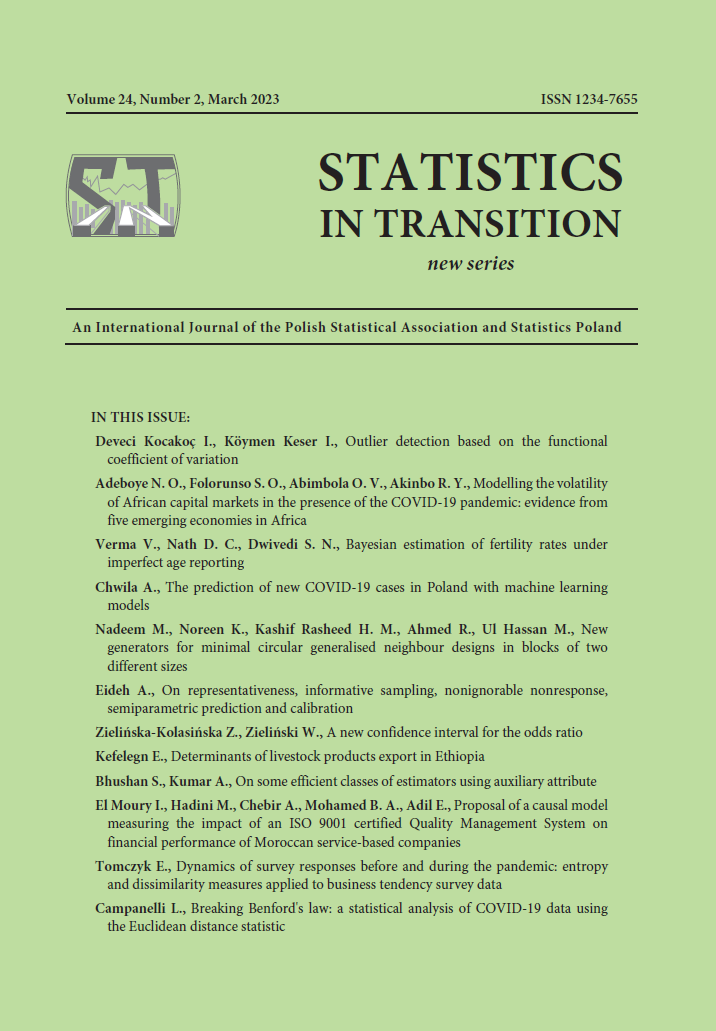ARTICLE
ABSTRACT
Informative sampling refers to a sampling design for which the sample selection probabilities depend on the values of the model outcome variable. In such cases the model holding for the sample data is different from the model holding for the population data. Similarly, nonignorable nonresponse refers to a nonresponse mechanism in which the response probability depends on the value of a missing outcome variable. For such a nonresponse mechanism the model holding for the response data is different from the model holding for the population data. In this paper, we study, within a modelling framework, the semi-parametric prediction of a finite population total by specifying the probability distribution of the response units under informative sampling and nonignorable nonresponse. This is the most general situation in surveys and other combinations of sampling informativeness and response mechanisms can be considered as special cases. Furthermore, based on the relationship between response distribution and population distribution, we introduce a new measure of the representativeness of a response set and a new test of nonignorable nonresponse and informative sampling, jointly. Finally, a calibration estimator is obtained when the sampling design is informative and the nonresponse mechanism is nonignorable.
KEYWORDS
calibration, representative measure, response distribution, nonignorable nonresponse, informative sampling esign.
REFERENCES
Chambers, R., Skinner, C., (2003). Analysis of Survey Data. New York: John Wiley.
Deville, J. C., Särndal, C. E. (1992). Calibration Estimators in Survey Sampling. Journal of the American Statistical Association, 87, pp. 376–382.
Eideh, A. H., (2020). Parametric Prediction of Finite Population Total under Informative Sampling and Nonignorable Nonresponse. Statistics In Transition new series, March 2020, vol. 21, no.1, pp. 13–35.
Eideh, A. H., (2016). Estimation of Finite Population Mean and Superpopulation Parameters when the Sampling Design is Informative and Nonresponse Mechanism is Nonignorable. Pakistan Journal of Statistics and Operation Research (PJSOR). Pak.j.stat.oper.res, vol. XII, no. 3, 2016, pp. 467–489.
Eideh A. H., (2012). Estimation and Prediction under Nonignorable Nonresponse via Response and Nonresponse Distributions. Journal of Indian Society of Agriculture Statistics, 66(3), pp. 359–380.
Eideh A. H., (2009). On the use of the Sample Distribution and Sample Likelihood for Inference under Informative Probability Sampling. DIRASAT (Natural Science), vol. 36 (2009), no.1, pp. 18–29.
Eideh A. H., (2007). Method of Moments Estimators of Finite Population Parameters in Case of Full Response and Nonresponse. Contributed Paper for the 56th Biennial Session of the International Statistical Institute, August 22–29, Lisboa, Portugal, ISI 2007 Book of Abstracts, p. 430.
Fuller W. A., (2009). Sampling Statistics. Wiley.
Little, R. J. A., (1982). Models for nonresponse in sample surveys. Journal of the American Statistical Association, 77, pp. 237–250.
Pfeffermann, D., Krieger, A. M. and Rinott, Y. (1998). Parametric distributions of complex survey data under informative probability sampling. Statistica Sinica, 8, pp. 1087–1114.
Schouten, B., Cobben, F. and Bethlehem, J., (2009). Indicators for the representativeness of survey Response. Survey Methodology, 35, pp. 101–113.
Sverchkov, M., (2008). A New Approach to Estimation of Response Probabilities When Missing Data Are Not Missing at Random. Proceedings of the Survey Research Methods Section, pp. 867–874.
Sverchkov, M., Pfeffermann, D., (2004). Prediction of finite population totals based on the sample distribution. Survey Methodology, 30, pp. 79–92.
